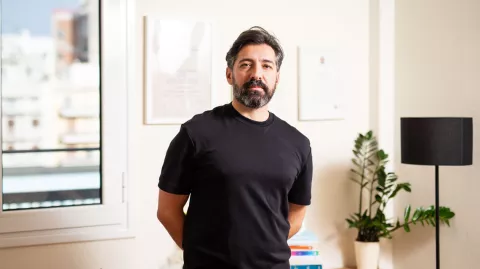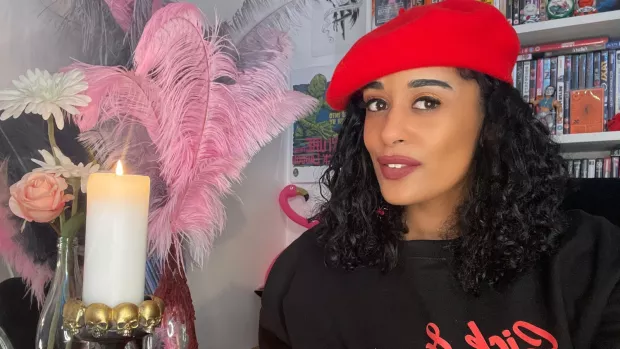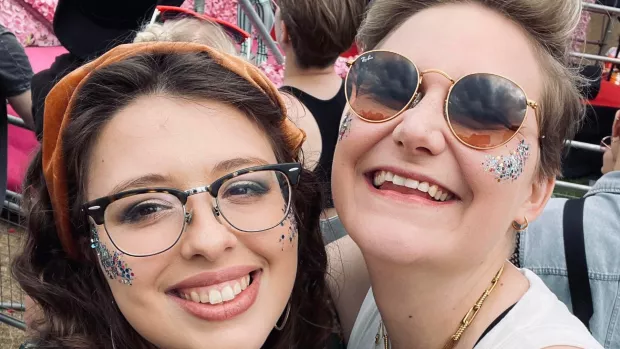
The power of belonging to an accepting community is healing
Chartered Psychologist Periklis Papaloukas devoted his PhD to learning about the needs and experiences of people living with MS and within LGBTQIA+ communities. We speak to him during LGBT+ History Month.
What led you to undertake this research?
Knowledge and human connection are part of my core beliefs. As a psychologist with an interest and expertise in health, I’m fascinated by chronic illness's psychological and social impacts on people’s lives. But also by the health experiences of people from minority groups. When I first explored what is out there, I found there's very little research into LGBTQIA+ experiences and chronic illness – especially autoimmune neurological conditions.
I chose MS because it has specific impacts on people, but also because someone close to me is living with it.
What did you learn from your conversations with people with MS?
I talked to dozens of people around the world – about half of these were from the UK. They were from all walks of life and all LGBTQIA+ communities. There was of a wide range of ages too – the youngest was 18 and the oldest 65.
Being thankful is the first thing that comes to mind when people ask me what I learned from talking to these people for so long. I'm thankful for all the things my PhD path has taught me.
I realised that being LGBTQIA+ and having MS is a complicated life experience – 300 pages aren't enough to describe it.
What didn’t surprise me was the similarities in experience for people living with MS. But many people I spoke to faced additional stigmas and discrimination on top of those linked with MS. And of course, there are other differences that affect people's experiences within the LGBTQIA+ community – such as age, ethnicity and gender.
What kind of barriers do people in LGBTQIA+ communities with MS commonly face?
LGBTQIA+ people living with MS must navigate not only discrimination from society for their sexuality, gender identity, or both – but also within the healthcare system. Incidents of homophobia and transphobia colour their experiences.
One person told me: “I was with my partner and we went into the appointment, and [the neurologist] said: "is this your friend?" [When] I said "this is my fiancée", he looked mortified!”
LGBTQIA+ people live with this discrimination but also with the stigma of MS and disability.
What I found interesting is that several of my participants talked about the support from their communities, but they also felt the LGBTQIA+ community could be more understanding and accepting.
MS and disability can have a powerful impact on people’s connection to others and to groups within LGBTQIA+ communities. Accessibility in LGBTQIA+ spaces is lacking, which stops disabled people being able to reach out and connect with others. But at the same time, their sexuality and gender identity can stop them from being their whole authentic selves within MS contexts, such as support groups. As one of my participants put it: “It’s like a double whammy because people would stare at me for multiple reasons.”
Did your research give insight into the type of support or actions that might help people to overcome these barriers?
I wouldn’t be fair if I didn’t also focus on the resilience of LGBTQIA+ people living with MS and their ability to bounce back following setbacks. People I spoke to often employ strategies linked to their gender or sexuality identity, like support from their chosen families and LGBTQIA+ affirmative healthcare.
For some, the experience of previously disclosing their gender or sexuality identity helped them find more strategic ways of disclosing their health status and MS diagnosis. These strategies can also be used to help relieve other issues. For example, virtual supportive spaces and communities can help address the lack of connection and isolation. Also, raising awareness within LGBTQIA+ spaces can assist in raising the visibility of disabled individuals in the community.
Clearly, people from LGBTQIA+ communities should feel welcome in any MS-specific setting, something that I am happy to see from MS Society UK.
And of course, everyone diagnosed with MS should feel understood and welcomed in healthcare settings. This may mean they need LGBTQIA+ specific healthcare or treatment, plus a heightened sensitivity by healthcare professionals.
Why is important that we recognise minoritised groups? And what can we do about the issue of this recognition sometimes leading to further hate and discrimination online?
It’s crucial to recognise minority groups within MS contexts, firstly because, as we know, MS is a highly individualised condition. Not only because of the different types of MS, the numerous expressed symptoms and the different progression paths. But because people from minority groups also have specific cultural, social, and psychological contexts that might also be impacted by MS. For example, bodies can be strong connectors for some people in expressing their social and psychological identity. MS, as a condition that impacts the body, can disrupt those realities.
It’s vital for their psychological welfare that we keep highlighting the stories of the people from minority groups living with MS. Especially in this current climate of online hate, harassment, and discrimination! How can we do this? Better moderation strategies and by offering support – psychological, legal, and practical – to people who are harassed for being different. People from minority groups living with MS also need to hear the rest of the MS community speaking up against those abusing voices. The power of belonging to an accepting community is healing.
Where will your research take you next?
I want to raise awareness about LGBTQIA+ issues within MS and chronic illness contexts and to support people practically within our community. As a researcher-academic and a psychologist, I believe that research shouldn’t just be about gaining knowledge. It should also be about applying that knowledge to better people’s lives!
Periklis would like to thank the participants of his research for allowing him to hear their stories and learn about their struggles and triumphs. He'd also like to thank us for our help during the recruitment phase of his PhD and for platforming LGBTQIA+ people’s voices.




